The tempo of Taliban bombings in Afghanistan is increasing as the United States prepares to withdraw its forces in September, including a Monday rocket attack on the governor’s compound in Kunar province that killed at least 16 children during a religious ceremony.
Kunar governor Iqbal Sayeed said Monday that a Quran recital competition was being held at his compound when a Taliban rocket struck, killing three members of the Afghan security forces and several religious affairs officials in addition to at least 16 children.
Another Taliban attack on Monday injured six people with a roadside bomb in the city of Jalalabad, while Taliban fighters killed eight members of a police unit in Logar province on Sunday.
According to the Afghan Interior Ministry, the Taliban has carried out 62 bomb attacks and six suicide bombings over the past 11 days, killing 63 civilians and wounding 180.
At a news conference on Sunday, U.S. Army Gen. Austin S. Miller, commander of U.S. forces in Afghanistan and the NATO “Resolute Support” mission, said he has been given a “set of orders” to “conduct an orderly withdrawal from Afghanistan.” Withdrawal was scheduled to begin by May 1 under the Trump administration, but has been delayed to September by President Joe Biden.
Miller said coalition bases and equipment will be “transitioned” to Afghan security forces.
“I often get asked, how are the security forces, can the security forces do the work in our absence? And my message has always been the same. They must be ready. They must be ready,” Miller told Afghan journalists.
Miller said it “does not make sense” for the Taliban to pull out of peace talks with the Afghan government, as they did last week.
The talks were supposed to begin in Turkey over the weekend, but the Taliban denounced the negotiations as a U.S. effort to hold more “ridiculous democratic elections” and create a government full of “quislings.”
Turkish Foreign Minister Mevlut Cavusoglu said last week that Afghanistan peace talks have been “postponed,” but not canceled, “since there is no clarity about the formation of the delegations and participation.”
Miller argued “a return to violence would be senseless and tragic,” but the Taliban seems to disagree on the former point.
The Taliban is apparently demanding more unilateral releases of prisoners from Kabul as their price for returning to the negotiating table. The government grudgingly released 5,000 Taliban prisoners last year and believes many have returned to the battlefield, helping to account for the recent surge in violence. A Taliban negotiator claimed on Sunday that 7,000 more prisoners “will be released” soon.
At a Pentagon briefing made public over the weekend, CENTCOM commander Gen. Kenneth F. McKenzie Jr. strongly suggested Afghanistan’s neighbors, especially Pakistan, should be “concerned” that groups like al-Qaeda and the Islamic State “will be able to regenerate if pressure is not kept on them” after U.S. and NATO forces withdraw.
“It’s a concern of all the Central Asian states to the north,” McKenzie said. “It is even of concern to Iran in the west.”
McKenzie added that U.S. diplomats are working on getting permission from neighboring countries to base American troops and aircraft within striking distance of Afghanistan — a move he implied Pakistan should think carefully about blocking, because its own national interests depend on preventing Afghanistan from becoming a terrorist haven.

COMMENTS
Please let us know if you're having issues with commenting.